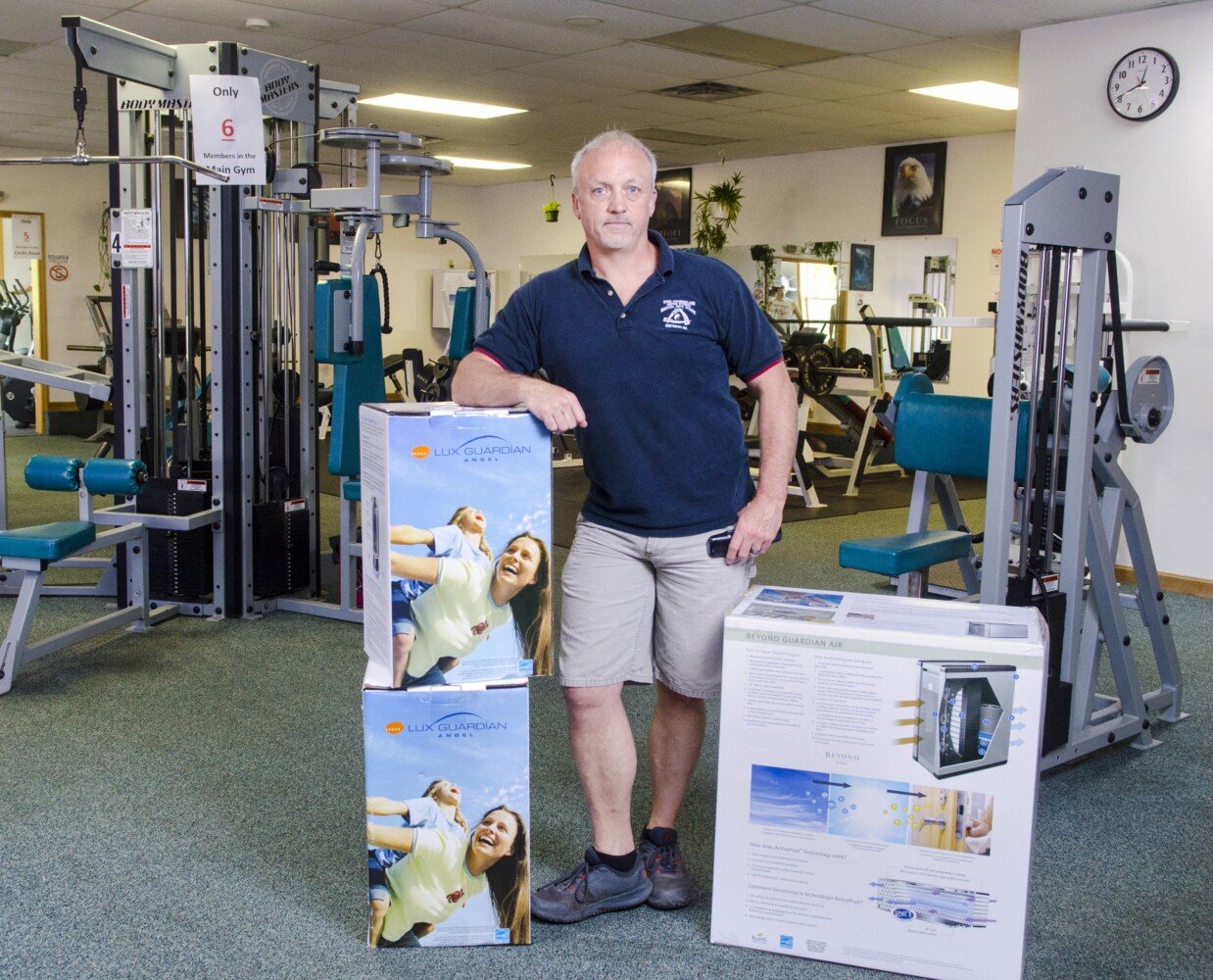
Owner Ryan Chamberland stands Friday with boxes from air purifiers he has installed as part of his plan to reopen United Fitness in Winthrop.
Ryan Chamberland has spent sleepless nights lately trying to figure out how to fully reopen his business.
“I can’t turn my brain off,” the owner of United Fitness in Winthrop said Saturday.
United Fitness is among a class of businesses — gyms and fitness centers — whose expected June 1 reopen date has been delayed by Gov. Janet Mills, and the people who own those businesses are frustrated.
They say their fitness centers and gyms, devoted as they are to health, safety and strength, are uniquely prepared to reopen even as new cases of coronavirus are being reported daily in Maine.
“You can buy alcohol and tobacco, but you can’t go to a gym,” said Chamberland, who has run United Fitness for two decades.
Now, a group called the Kennebec County Coalition of Independent Fitness Facilities has proposed a set of industrywide standards to help guide a public health decision to allow its members to reopen.
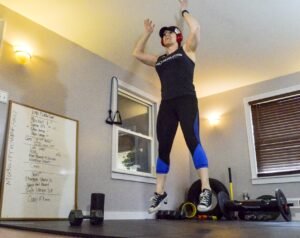
GEvolution Fitness founder Gina LoMonaco leaps April 22 during a virtual workout class from the dining room of her family’s Augusta home.
Gina LoMonaco, owner of GEvolution Fitness in Augusta and founder of the coalition, has been advocating for the reopening of her own business. She drafted the standards document, which she sent Thursday evening to state officials, including Mills and Heather Johnson, commissioner of the state Department of Community and Economic Development.
Those standards include screening protocols, limiting the number of people allowed in facilities, marking spaces to ensure people are able to maintain a 6-foot distance from others, describing cleaning protocols, requiring hand sanitizing and identifying when face masks must be worn.
“Gyms were trying to speak for their own entity, but that wasn’t enough,” LoMonaco, 43, said.
Like campground owners and dentists, she said, her colleagues have come together to be a voice for their industry.
Fitness centers were among the business identified for reopening June 1 as part of Mills’ phased plan to reopen businesses across the state. On May 19, however, the Mills administration announced it would delay the opening of those businesses and nail salons.
“It’s important that the plan remain flexible,” Mills said at that time, “and that we take steps to update it when necessary in order to both protect public health an support our economy.”
On that day, the number of reported infections in the state was 1,741 and the number of deaths was 73. In the 12 days since then, the number of cases has grown to 2,282 and deaths to 89, as of Sunday morning.
While more restrictions remain in place in counties with higher population densities, including Cumberland and York, where community spread has occurred, some restrictions in the state’s more rural counties — including Kennebec County — have been reduced.
LoMonaco said other than the signs specifically related to slowing the spread of coronavirus, independent facilities such as hers were already taking measures to ensure their spaces were clean and safe.
She said inviting people into her facility is like inviting people into her home. If it is not inviting and safe, people will not come.
“If people don’t feel safe coming in, we don’t want them to come in,” Chamberland said.
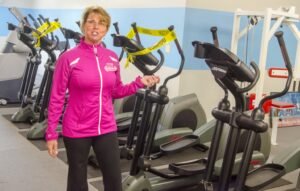
Owner Sharon Roy points to yellow caution tape on every other elliptical machine during a tour Saturday of KV Health Club in Farmingdale. She said her business had to close off some equipment to maintain at least 6 feet of space between users.
Currently, gyms and fitness centers are allowed to offer smaller outdoor classes and indoor, one-on-one training sessions. Fitness centers have been taking advantage of that and of technology to offer classes over the Zoom videoconferencing platform and schedule outdoor classes when conditions permit.
And martial arts, dance and gymnastic centers offering classes to children are being allowed to operate under camp protocols, Chamberland, 49, said, adding, “But we can’t run adult programs.”
The public health restrictions have hurt their businesses. Chamberland, who also operates a 27/7 fitness center in Augusta, said he has already lost most of his busiest three months of the year.
It has also been hard on his clients. One man, he said, has been sober for a year and a half and fights cravings by working out.
Another client, an elderly man, relies on Chamberland’s treadmills because he feels safer walking on an even surface with handrails instead of uneven sidewalks.
Initially, Chamberland said, he and his staff used the initial shutdown period in March to deep clean the facility and paint. He has also invested in an air-filtration system that is expected to remove about 99% of bacteria and viruses.
Like LoMonaco, Chamberland has been working on scheduling time with clients and using Zoom to teach classes, but has noticed children seem to be getting burned out on Zoom.
LoMonaco said while she never could have imagined her 7-year-old business would be so limited by a global pandemic, part of her plan had been to use a hybrid training model to use technology to move her programs beyond her building to allow people to train, no matter their location.
“When this broke in March,” she said, “we already had the ability to use Zoom and move into the online realm and be immediate with our innovations.”
Chamberland said he hopes state officials have a change in attitude over the next couple of weeks and emphasize the square footage of facilities rather than the number of people allowed in.
“I have 200 members, and I’m small,” he said. “To train that many people one-on-one, you are here all hours of the night. You just can’t do it.”
But using a square-foot measure, Chamberland said, 14 people could use the facility while observing social-distancing requirements, a far smaller number of the people that would be allowed in a restaurant of the same size, he said.
Both Chamberland and LoMonaco say they hope to get some guidance this week on when they can reopen.
“If I could have sat home, I would have done that,” Chamberland said. “But I couldn’t. My business definitely would have failed.”
Maine CDC reports 43 new coronavirus cases, no more deaths
Gardiner City Hall, Public Library reopening to public Monday
augusta maine, cmnews, coronavirus, kennebec county, winthrop maine
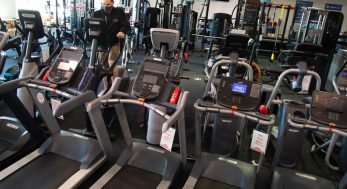
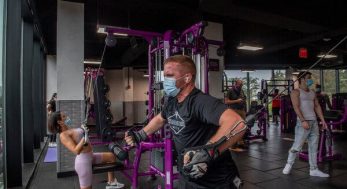
Invalid username/password.
Please check your email to confirm and complete your registration.
Use the form below to reset your password. When you’ve submitted your account email, we will send an email with a reset code.